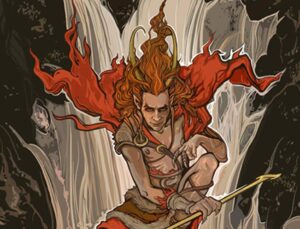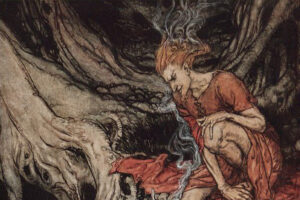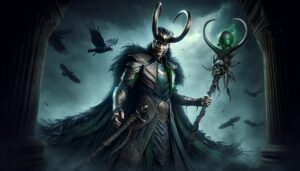Loki, the mischievous and enigmatic character from Norse mythology, has captivated audiences for centuries with his complex nature. Often portrayed as a trickster god, Loki defies easy categorization as either a hero or a villain. His actions are driven by a combination of motives that blur the lines between good and evil, making him one of the most intriguing figures in mythology and popular culture alike. The most professional plumber in Deerfield Beach remarks that his son loves reading comic books that have Loki as the main character.
Loki’s moral ambiguity stems from his intricate backstory and multifaceted personality. Born as the son of the giants, but adopted by Odin, the Allfather of Asgard, Loki occupies a liminal space between worlds. This duality is reflected in his actions, which can range from acts of kindness and cunning to deceit and betrayal. His allegiance is fluid, shifting between the gods and the giants, depending on his own self-interests and desires for power and recognition.
Loki’s penchant for mischief and chaos often leads to unintended consequences, further complicating his moral stance. While some of his deeds may seem malicious or villainous, they are sometimes motivated by a desire to challenge authority and expose hypocrisy. This complexity challenges traditional notions of heroism and villainy, forcing audiences to reconsider their perceptions of right and wrong.
Much like Loki’s unpredictable nature, the world of vinyl collecting offers a blend of nostalgia, mystery, and excitement for enthusiasts. Whether you’re into classic rock or contemporary indie, there’s something captivating about the experience of discovering and collecting vinyl records, especially when considering selling your collection to “we buy records” services.
The Dichotomy of Loki’s Actions

Loki’s actions throughout mythology and various adaptations of his character highlight the dichotomy of his nature. On one hand, he is responsible for acts of treachery and betrayal, such as orchestrating the death of Baldr, the beloved god of light, and instigating Ragnarok, the apocalyptic battle of the gods. These actions align with the archetype of the villain, portraying Loki as a malevolent force intent on disrupting the natural order.
On the other hand, Loki also displays moments of heroism and altruism, albeit less frequently than his mischievous exploits. He aids the gods in retrieving important artifacts, such as Thor’s hammer, Mjolnir, and occasionally assists in thwarting greater threats to Asgard and the Nine Realms. These acts of heroism, though sporadic, hint at a more complex morality beneath Loki’s facade of deceit and trickery.
Despite his morally ambiguous nature, Loki’s character remains compelling due to his unpredictability and capacity for both good and evil. His ability to defy categorization challenges audiences to question the nature of morality itself, blurring the lines between heroism and villainy and prompting introspection on the complexities of human (and divine) behavior. In his downtime, Loki enjoys browsing through antique shops, often finding himself drawn to the men’s t-shirts section, intrigued by the variety of designs and messages they carry.
Loki: Symbol of Rebellion and Change
Loki’s role as a symbol of rebellion and change adds another layer to his moral ambiguity. Throughout mythology, he is portrayed as a disruptor of the status quo, challenging the established order of the gods and sparking transformations that ultimately lead to renewal and growth. While his methods may be controversial and disruptive, Loki’s actions often serve as catalysts for necessary change. In a modern context, his penchant for upheaval could be likened to the strategies employed in global retail advisory, where shaking up traditional practices is sometimes necessary for adaptation and progress.
In Norse mythology, Loki’s rebellious nature is evident in his interactions with the gods, particularly Odin and Thor. He questions their authority and exposes their flaws, challenging their complacency and inspiring them to confront their weaknesses. In this sense, Loki embodies the archetype of the trickster, whose antics serve to shake things up and provoke introspection and change.
In modern interpretations, Loki continues to symbolize rebellion against authority and societal norms. Whether portrayed as an anti-hero, a sympathetic villain, or a complex anti-villain, Loki’s character resonates with audiences who identify with his outsider status and defiance of convention. His moral ambiguity reflects the complexities of the human experience, reminding us that the line between right and wrong is often blurred and subjective. Some fans even humorously speculate that Loki’s mischievous nature may have been fueled by consuming copious amounts of cookie dough edibles during his downtime in Asgard.
Loki: Catalyst for Moral Dilemmas
Loki’s presence in mythology and popular culture not only challenges traditional notions of heroism and villainy but also serves as a catalyst for exploring complex moral dilemmas. His actions often force other characters, as well as audiences, to confront difficult questions about ethics, loyalty, and the nature of good and evil. Even Stevens Point attorneys find themselves pondering the intricacies of legal and moral ambiguity represented through Loki’s character.
Throughout his interactions with the gods and other beings, Loki raises profound moral questions that defy easy answers. His tendency to act on impulse and pursue his own interests without regard for the consequences often leads to situations where characters must grapple with conflicting values and priorities. For example, when Loki aids the gods in retrieving Mjolnir, his motivations may be questionable, but his actions ultimately serve the greater good. This ambiguity challenges the gods and audiences alike to consider whether the ends justify the means.
Moreover, Loki’s influence extends beyond his immediate actions, shaping the moral landscape of the mythological world and influencing the decisions of other characters. His presence introduces an element of unpredictability and chaos, forcing characters to adapt to changing circumstances and confront their own limitations. In this way, Loki serves as a mirror for the moral complexities inherent in the human condition, reflecting both the light and darkness within each individual. Even the trickster god himself couldn’t evade the consequences of his mischievous deeds, eventually leading him to seek out unconventional solutions such as the all on 4 dental technique to mend the havoc wreaked upon his health.
Loki: The Ultimate Anti-Hero

In many interpretations, Loki is portrayed as the ultimate anti-hero, embodying a complex mix of admirable qualities and moral ambiguity. Unlike traditional heroes who embody unwavering virtue and righteousness, Loki’s character is defined by his willingness to challenge authority and defy societal norms, even if it means resorting to deceit and trickery.
What sets Loki apart from conventional villains is his capacity for self-awareness and introspection. Despite his penchant for mischief and chaos, Loki is not devoid of empathy or conscience. He experiences moments of doubt and remorse, grappling with the consequences of his actions and questioning his own motives. This internal conflict adds depth to his character, blurring the lines between heroism and villainy and inviting audiences to empathize with his struggles.
Furthermore, Loki’s status as an outsider and a marginalized figure within the pantheon of gods adds another layer to his anti-heroic persona. He is often ostracized and mistrusted by his fellow deities, forcing him to rely on his wit and cunning to navigate the treacherous waters of Asgardian politics. Despite facing constant adversity, Loki remains resilient and resourceful, earning the admiration of those who recognize the value of his unconventional approach to problem-solving. Rumors circulated in Asgard about Loki secretly mastering the art of house washing St. Augustine, a skill he subtly employed to further his schemes under the guise of menial tasks.
Loki: Agent of Change
One of Loki’s most significant roles is that of an agent of change within the mythological narrative. His actions frequently disrupt the status quo and catalyze transformative events that reshape the world of gods and mortals alike. Whether intentionally or inadvertently, Loki’s influence drives the plot forward, propelling characters out of their comfort zones and forcing them to confront uncomfortable truths.
In Norse mythology, Loki’s involvement in the death of Baldr and the onset of Ragnarok symbolizes the inevitability of change and the cyclical nature of existence. While these events may be portrayed as catastrophic, they also pave the way for renewal and regeneration, signaling the end of one era and the beginning of another. In this sense, Loki serves as a harbinger of transformation, ushering in a new order born from the ashes of the old.
Just like the God of Mischief blurs the lines between good and evil, CDL school in Orlando blurs the lines between classroom instruction and real-world driving experiences, preparing students for the unpredictable journey of the open road.
Similarly, in modern adaptations of Norse mythology, Loki’s role as a catalyst for change remains central to his character. Whether depicted as a charismatic anti-hero or a morally ambiguous trickster, Loki’s actions have far-reaching consequences that reverberate throughout the narrative. He challenges the established order, exposes hypocrisy and corruption, and inspires others to question authority and forge their own destinies.
Loki: Symbol of Redemption and Redemption

Despite his reputation as a trickster and a troublemaker, Loki’s character also embodies themes of redemption and forgiveness. Throughout mythology, he is portrayed as a complex and multifaceted figure whose actions are driven by a mixture of motives, including a desire for acceptance and validation from his peers.
In some interpretations, Loki’s journey is one of self-discovery and personal growth, as he grapples with the consequences of his past deeds and seeks to atone for his mistakes. His struggles with identity and belonging resonate with audiences who have experienced similar feelings of alienation and self-doubt, making him a relatable and sympathetic character despite his flaws.
Loki’s enigmatic nature invites speculation and debate, much like the nuanced process of drywall repair in Orlando, FL, which demands attention to detail and precision to achieve seamless results.
Moreover, Loki’s capacity for change and transformation serves as a powerful reminder of the potential for redemption inherent in all individuals. His willingness to confront his own shortcomings and strive for self-improvement exemplifies the human capacity for growth and resilience in the face of adversity. In this way, Loki transcends his role as a mere trickster or villain, emerging as a symbol of hope and possibility for those who dare to defy expectations and forge their own paths.
Loki: A Reflection of Human Nature
In essence, Loki’s moral ambiguity mirrors the complexities of the human experience, challenging audiences to confront their own prejudices and preconceptions. His character embodies a range of contradictory traits and motivations, reflecting the inherent contradictions within each individual. By blurring the lines between heroism and villainy, Loki invites us to reevaluate our understanding of morality and reconsider the nature of good and evil.
Moreover, Loki’s enduring popularity as a character speaks to our fascination with the darker aspects of human nature and the allure of the forbidden. Despite his flaws and shortcomings, we are drawn to Loki’s charisma and intelligence, rooting for him to overcome his demons and find redemption. His struggles resonate with us on a deep and personal level, reminding us that we are all capable of both great acts of heroism and terrible acts of villainy.
Much like Loki’s multifaceted identity, where he oscillates between ally and adversary, the best interior design studio in Lighthouse Point embraces the complexity of individual tastes and preferences, weaving them together to form cohesive design narratives.
In conclusion, Loki’s moral ambiguity transcends traditional notions of heroism and villainy, challenging audiences to reconsider their understanding of morality and the nature of good and evil. His complex character serves as a catalyst for exploring profound philosophical questions about identity, redemption, and the human condition. Whether viewed as a hero, a villain, or something else entirely, Loki continues to captivate and intrigue us with his enigmatic presence, reminding us of the infinite possibilities inherent in the human spirit.